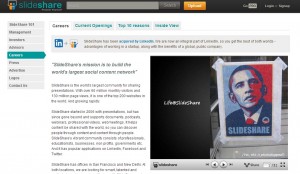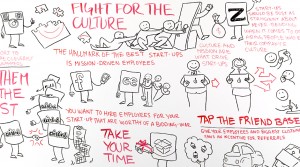Just like “Marketing is too important to be left to the marketing department”, for start-ups
Hiring is too important to be left to the HR department.
In the previous post I talked about ‘Who to hire for your start-up‘. Many of you agreed to most of what I shared so the next question that comes out is how to hire these guys. As @mohak put it brilliantly
Recruitment is marketing. If you can’t hire well, you can’t market well
If like most others you are finding it incredibly hard to recruit your A team here are some obvious and not so obvious tips
- Be Involved: Unless you have someone really well in the team who can handle this for you, be involved in hiring. Another pro tip is not to hire a standard HR professional to do the hiring for your start-up. I’m yet to see a regular HR person turn into a great start-up HR pro. Most of them just don’t have it in their DNA. To avoid bad hires, stupid hiring processes and missing out on some exceptional talent its best suggested to be on TOP yourself for as long as you can afford to be. Founders set the culture of the company and the people they hire initially defines it.
- Brand: Be it your founding team, your VCs, the cool tool/service that you are developing or the world changing impact you are going to have. The easiest and surest way to get talent is to be remarkable. Unless your company’s mention people go WOW, you’ll always have a tough time getting smart people to work for you. PR/Social Media/Customer Care or what ever it takes, make sure you have a plan to create a brand around your start-up
- Recruitment begins at home: This bit is so obvious that most start-ups tend to forget it. Every start-up should try to leverage their existing employees to hire more people. This is applicable as much to a 10 member start-up as to a 100 member. No one is better suited to spread the word about you than your existing workforce and you never know which one of your employees gets you whom. What’s needed for this to worka) Happy & Empowered Employees – Unless one likes their job/company they won’t spread the word and as a founder you need to make sure that your employees aren’t just having a great time working for you they are actually so proud that they’d shout out to all their great friends as invite them. However you at your end need to ensure that they are empowered enough to do this and don’t have any bad experience about the whole thing/process.
b) Incentives (Icing on the cake) – $$ or mobile phones, might just do wonders.Keep asking them for feedback about hiring/referral process and keep getting it implemented - Customers/Partners/Investors/Vendors: The second best source to get smart folks to work is to leverage the people who do business with you. Keep them in loop about your openings and you never know who they help you hire. They might not even need any incentives and would be just happy to do some matchmaking for you (Assuming you have a healthy relationship with them and serve or pay them well). A power user/customer is a great hire(obviously they need to be talented and not just power users), they’d be obsessive about the product and would already have some ideas on how to make things better. I’d given an arm to have a passionate customer join my start-up
- Promotion on Your Website: Sounds too obvious again? Trust me it’s not. Far from what some of you think. Only a handful of hundreds of start-ups use their website to promote their job openings. How many of you(founder) have an updated jobs page on your website? Here are some of them that “Get This”



- Social Media:
a) Sponsored ads on Facebook

b) Company Page on LinkedIn

c) Email Lists

- Content Marketing: Content is King” so to speak, for it has a life of it’s own. You can leverage content to market yourself and attract relevant employees. Interest content will find its way around layers of social media and reach places you can’t. Here are some examples


- Start-up Events/Meet-ups: I know by experience that most start-up events are as (or even less) than the websites/blogs that organize them but even those events attract some bright people who are just out to explore interesting opportunities. You should be checking these events every once in a while. Also, you can consider organizing some meet-ups/hackathons to attract enthusiastic folks.

- Internship portals/Start-up Websites: Some of these portals provide access to ambitious and talented people. Also,the sheer fact that some is following them means they are already a bit ahead of the curve
- Random Pick-up: This one is as nasty as it sounds. Like somebody’s blog post on tech architecture? Find someone’s slideshow amazing? Follow this amazing sales person on twitter? Stumbled upon a script on github that you found useful?
GO ahead and make contact. Start interacting with these folks and see if they’d like to join you in your journey.
The entire kwippy team was hired for Mpower Mobile(in 2008) like that
These 10 ways should help you with your hiring. Do share what you think about them and if you have any experiences around start-up hiring that others can benefit from
Update: Here’s another super geeky way to pick up nerds
